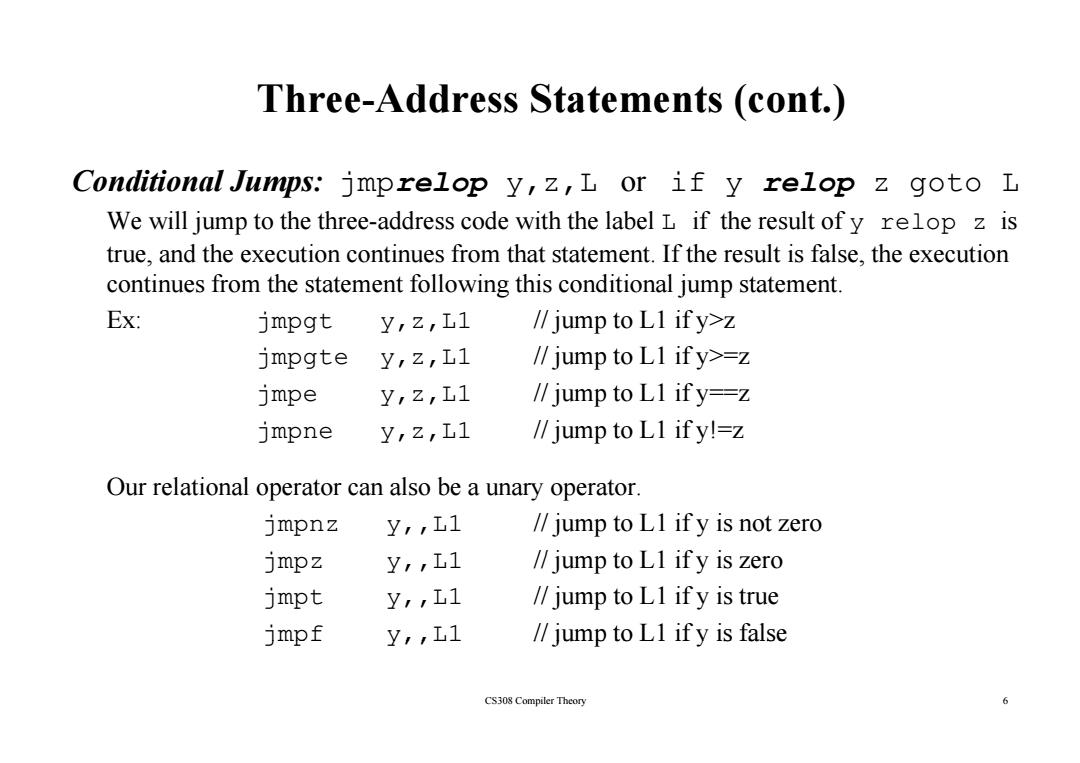
Three-Address Statements (cont.) Conditional Jumps:jmprelop y,z,L or if y relop z goto L We will jump to the three-address code with the label L if the result ofy relop z is true,and the execution continues from that statement.If the result is false,the execution continues from the statement following this conditional jump statement. Ex: jmpgt y,Z,L1 //jump to Ll if y>z jmpgte y,Z,L1 /jump to Ll ify>=z jmpe y,z,L1 /jump to Ll ify=-z jmpne y,Z,L1 /jump to Ll if y!=z Our relational operator can also be a unary operator. jmpnz Y,,L1 /jump to Ll ify is not zero jmpz y,,L1 /jump to Ll ify is zero jmpt y,,L1 /jump to Ll ify is true jmpf y,,L1 /jump to Ll ify is false CS308 Compiler Theory 6
Three-Address Statements (cont.) Conditional Jumps: jmprelop y,z,L or if y relop z goto L We will jump to the three-address code with the label L if the result of y relop z is true, and the execution continues from that statement. If the result is false, the execution continues from the statement followin g jp this conditional jum p statement. Ex: jmpgt y,z,L1 // jump to L1 if y>z jmpgte y,z,L1 // jump to L1 if y>=z jmpe y,z,L1 // jump to L1 if y==z jmpne y,z,L1 // jump to L1 if y!=z Our relational operator can also be a unary operator. jmpnz y,,L1 // jump to L1 if y is not zero j L1 mpz y,,L1 // j t L1 if i // jump to L1 if y is zero jmpt y,,L1 // jump to L1 if y is true jmpf y,,L1 // jump to L1 if y is false CS308 Compiler Theory 6 jmpf y,,L1 // jump to L1 if y is false
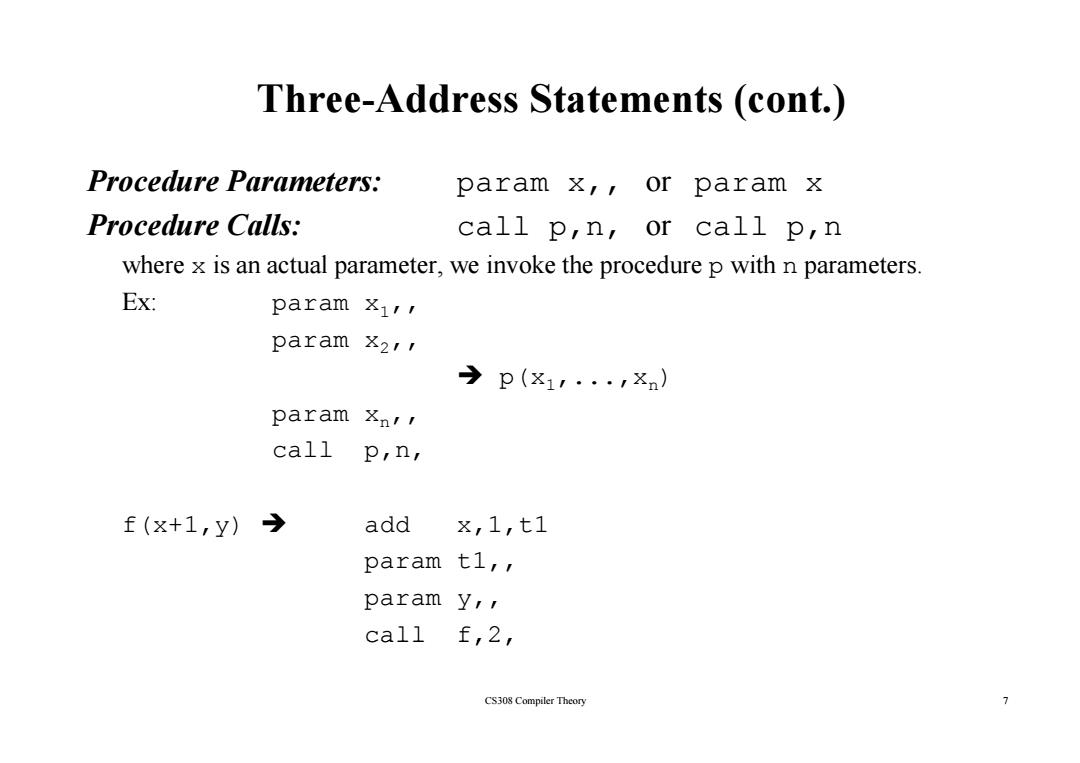
Three-Address Statements (cont.) Procedure Parameters: param x,,or param x Procedure Calls: call p,n,or call p,n where x is an actual parameter,we invoke the procedure p with n parameters. Ex: param x param ¥21I →p(x1,·.·,xm) param XnlI call pin, f(x+1,y)→ add x,1,t1 param t1,, param y, call f,2, CS308 Compiler Theory 7
Three-Address Statements (cont.) Procedure Parameters: param x,, or param x Procedure Calls: call p,n, or call p,n where x is an actual parameter, we invoke the procedure p with n parameters. Ex: param x 1,, param x 2,, Î p(x 1,...,x n) param x n,, call p,n, f(x+1,y) Î add x,1,t1 param t1,, param y,, call f,2, CS308 Compiler Theory 7 call f,2
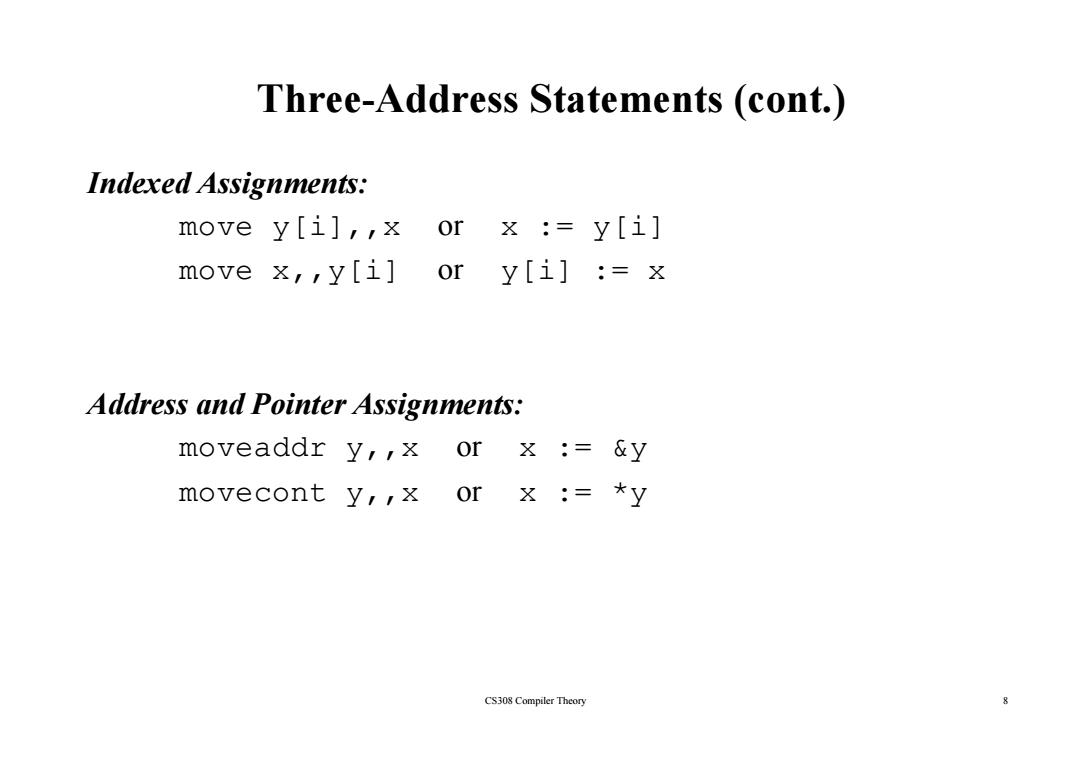
Three-Address Statements (cont.) Indexed Assignments: move y[i],x or x :=y[i] move x,,y[i] or y[i]:x Address and Pointer Assignments: moveaddr y,x or X:= &y movecont y,,x or x :*y CS308 Compiler Theory 8
Three-Address Statements (cont.) Indexed Assignments: move y[i],,x or x := y[i] move x,,y[i] or y[i] := x Address and Pointer Assignments: moveaddr y,,x or x := &y movecont y,,x or x := *y CS308 Compiler Theory 8
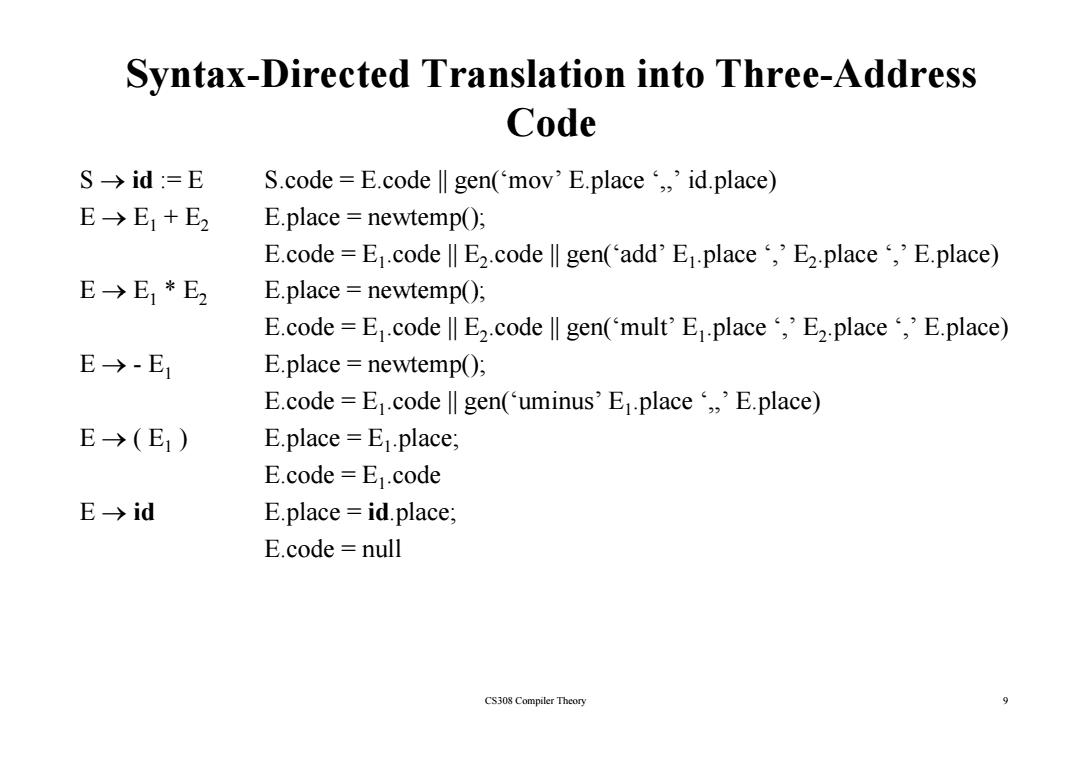
Syntax-Directed Translation into Three-Address Code S→id:=E S.code=E.code ll gen('mov'E.placeid.place) E→E1+E2 E.place newtemp(); E.code=Ei.code‖E2.code‖gen(add'E1.place‘,'E,place‘,'E.place) E→E1*E2 E.place newtemp(); E.code=Ecodel E2.codell gen(mult'Eplace,E2-place,E.place) E→-E1 E.place newtemp(); E.code=E1.code ll gen('uminus'E1.place,'E.place) E→(E1) E.place=E1.place; E.code=E.code E→id E.place=id.place; E.code null CS308 Compiler Theory
Syntax-Directed Translation into Three-Address Code S → id := E S.code = E.code || gen(‘mov’ E.place ‘,,’ id.place) E → E E E l () 1 + E 2 E.p lace = newtemp(); E.code = E1.code || E 2.code || gen(‘add’ E1.place ‘,’ E 2.place ‘,’ E.place) E → E1 * E 2 E place = newtemp(); 1 E 2 E.place newtemp(); E.code = E1.code || E 2.code || gen(‘mult’ E1.place ‘,’ E 2.place ‘,’ E.place) E → - E1 E.place = newtemp(); E.code = E1.code || gen(‘uminus’ E1.place ‘,,’ E.place) E → ( E1 ) E.place = E1.place; Ed E .co de = E1.co d e E → id E.place = id.place; E code . = null CS308 Compiler Theory 9
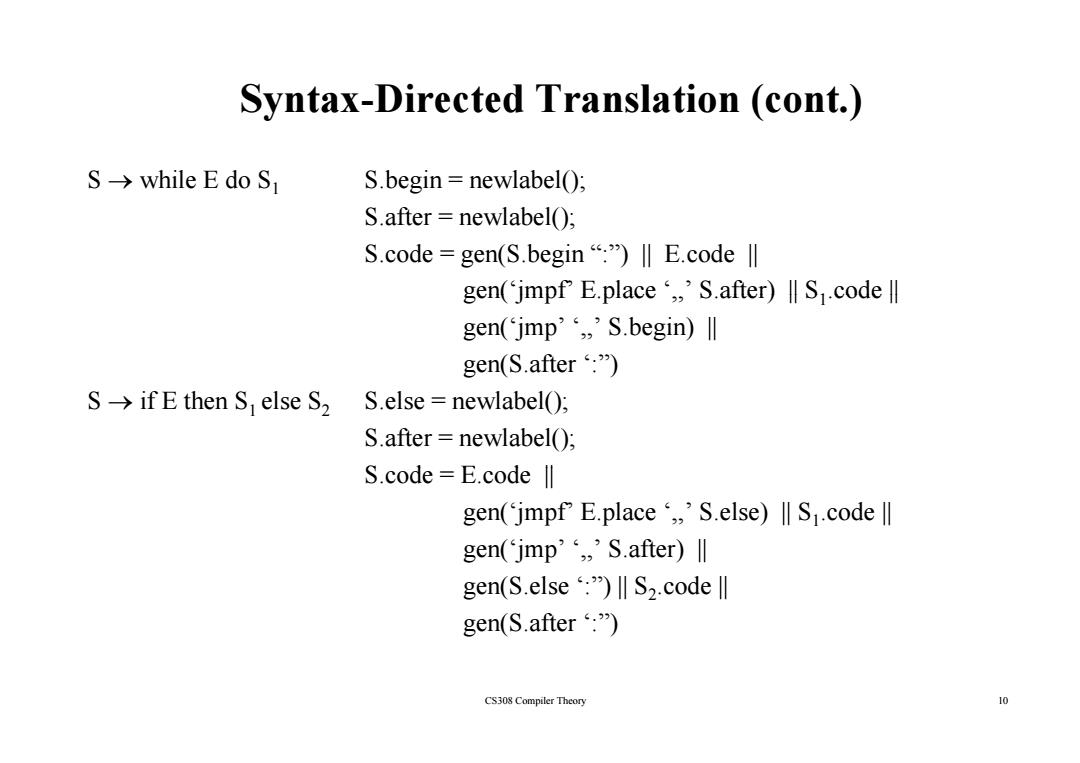
Syntax-Directed Translation (cont.) S-→while E do S, S.begin newlabelO); S.after newlabelO; S.code=gen(S.begin“:")‖E.code ll gen(‘jmpf E.place‘,'S.after)‖S1.code‖ gen(jmp',,'S.begin)ll gen(S.after :" S->if E then S else S2 S.else=newlabel(); S.after newlabel(); S.code=E.code‖ gen(jmpf E.place'S.else)ll S1.codell gen(jmp'‘,'S.after)‖ gen(S.else")Il S2.codell gen(S.after :" CS308 Compiler Theory 10
Syntax-Directed Translation (cont.) S → while E do S1 S.begin = newlabel(); S f l b l() S.a fter = new l a b el(); S.code = gen(S.begin “:”) || E.code || gen(‘jmpf’ E place ‘ ’ S after) || S1 gen( jmpf E.place ,, S.after) || S code || 1.code || gen(‘jmp’ ‘,,’ S.begin) || gen(S.after ‘:”) S → if E then S1 else S 2 S.else = newlabel(); S.after = newlabel(); S d E d || S.co de = E.co de || gen(‘jmpf’ E.place ‘,,’ S.else) || S1.code || gen( jmp ‘ ’ ‘,,’ S after) || S.after) || gen(S.else ‘:”) || S 2.code || gen(S.after ‘:”) CS308 Compiler Theory 10